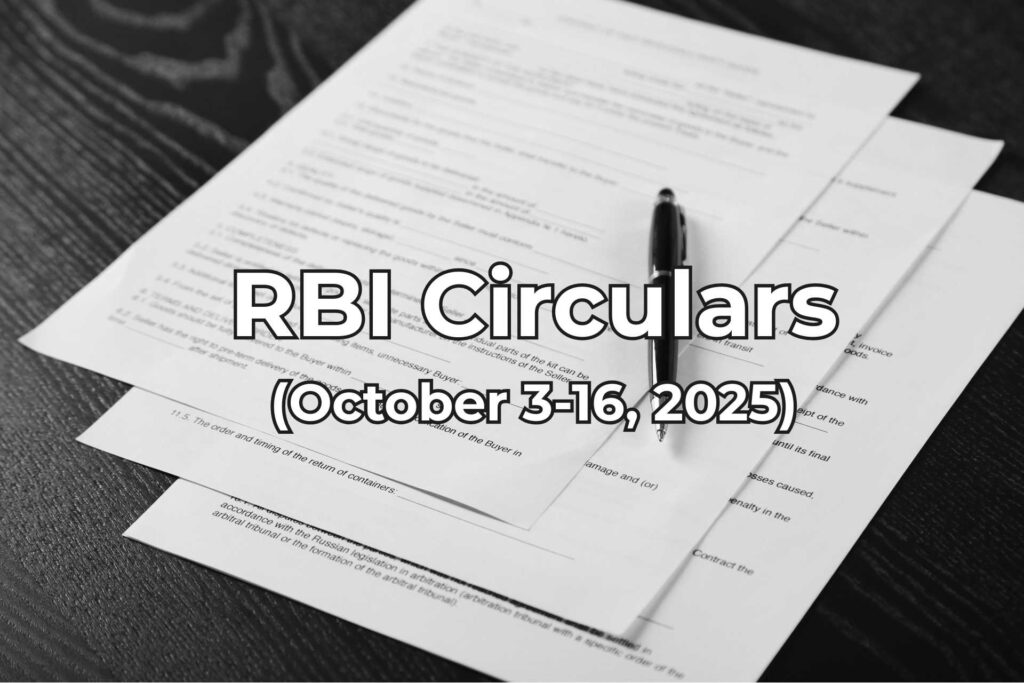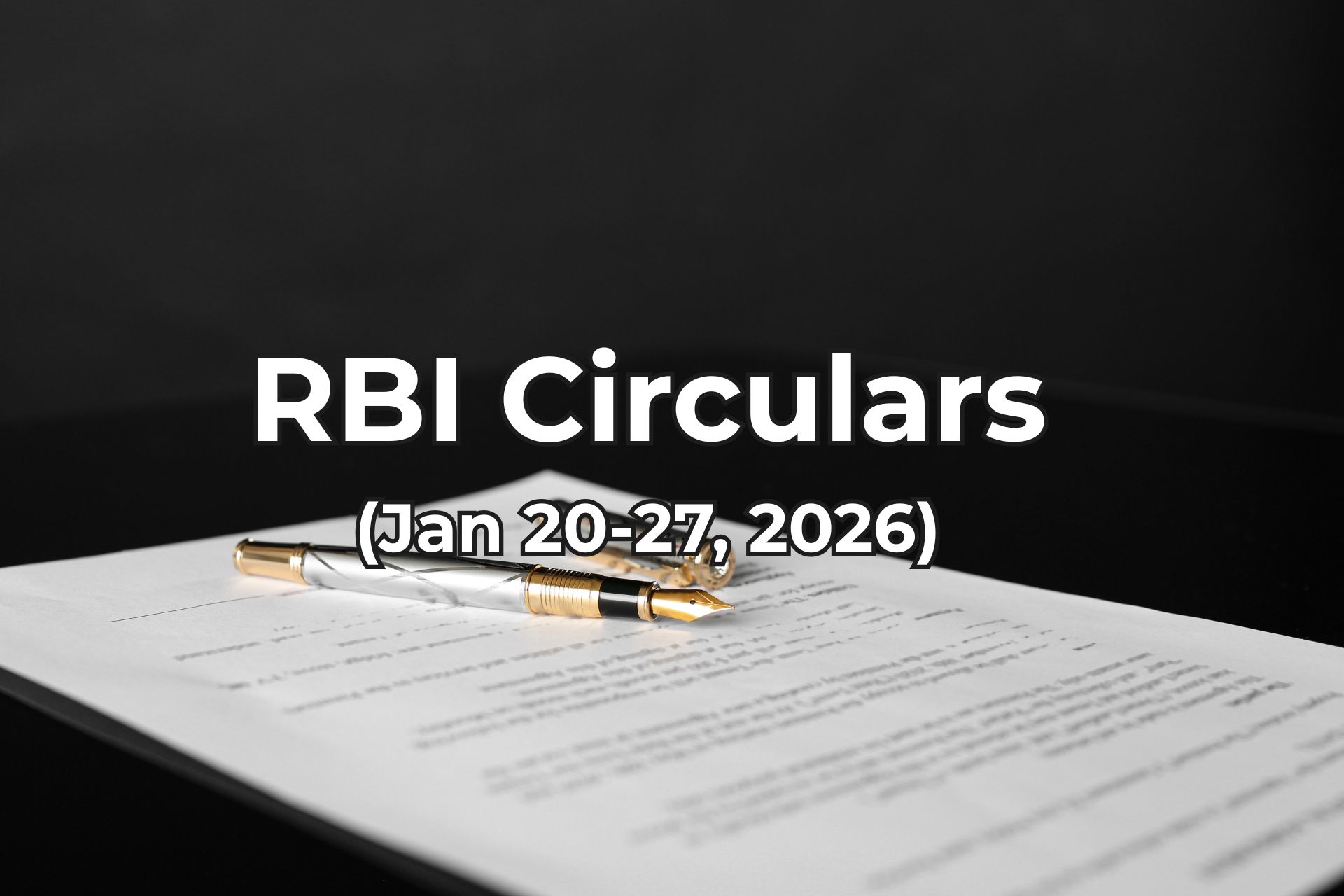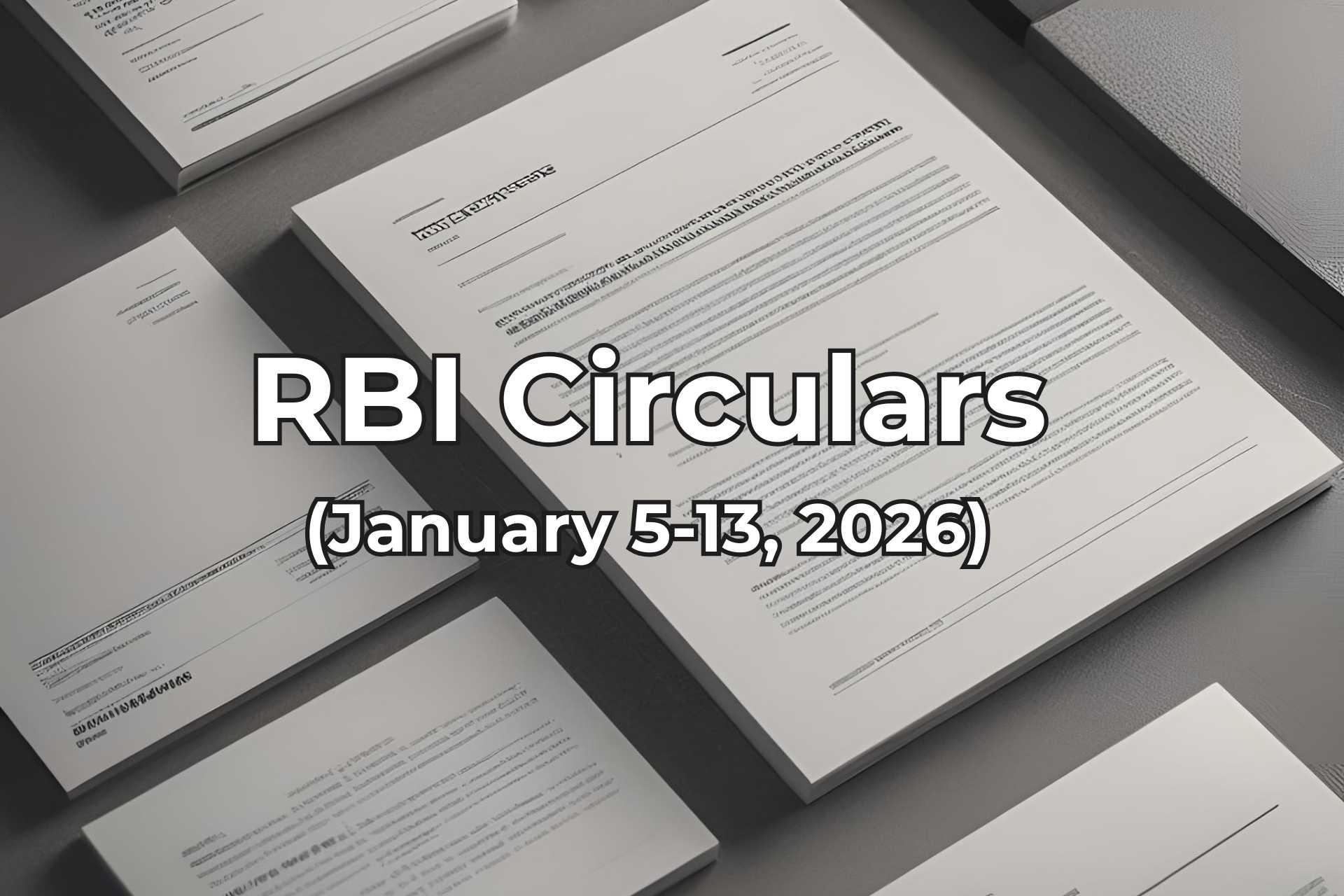We at Finakon track the regulatory changes. We also use AI to create a summary. We are providing a quick overview of the RBI circulars on a weekly basis on our website. The summary is neither exhaustive nor comprehensive. For accurate information, users shall refer to the original circular of the regulator. Finakon shall not be responsible for inferences drawn based on the summary provided.
Boost to INR Trade Settlement: RBI Opens New Investment Routes for Vostro Balances
The Reserve Bank of India (RBI) has issued new directions expanding the permissible investment avenues for balances held in Special Rupee Vostro Accounts under the framework for International Trade Settlement in Indian Rupees (INR).
As per A.P. (DIR Series) Circular No. 10 dated July 11, 2022, balances in these accounts could be used to invest in Government Treasury Bills and Government securities within prescribed limits under FEMA.
Through its latest A.P. (DIR Series) Circular No. 13 dated October 03, 2025, RBI has now permitted Authorised Dealer Category–I Banks (AD Banks) to allow investment of surplus balances in Special Rupee Vostro Accounts in non-convertible debentures (NCDs), bonds, and commercial papers issued by Indian companies, as per the guidelines and limits specified in the circular.
The directions have been issued under Sections 10(4) and 11(1) of the Foreign Exchange Management Act (FEMA), 1999, and take effect immediately. AD Banks have been advised to bring the contents of this circular to the notice of their constituents and customers.
https://website.rbi.org.in/web/rbi/-/notifications/international-trade-settlement-in-indian-rupees-inr-1
RBI Updates SRVA Rules under FEMA: Broader Investment Scope Introduced
The Reserve Bank of India (RBI) has announced new directions allowing persons resident outside India maintaining Special Rupee Vostro Accounts (SRVAs) to invest their rupee surplus balances in non-convertible debentures (NCDs), bonds, and commercial papers issued by Indian companies.
Earlier, under A.P. (DIR Series) Circular No. 9 dated August 12, 2025, such investments were limited to Central Government securities, including Treasury Bills. The latest notification now expands the list of eligible instruments under the Foreign Exchange Management (Debt Instruments) Regulations, 2019, and the Master Direction – RBI (Non-resident Investment in Debt Instruments) Directions, 2025.
As per the updated provisions:
- These investments will be reckoned under the investment limit for corporate debt securities under the General
- The minimum residual maturity and issue-wise limits applicable to FPIs under the General Route will not apply to investments made through the SRVA
- SRVA holders and their respective Authorised Dealer Category-I (AD) Banks will bear primary responsibility for compliance with applicable limits and
- AD Banks are required to facilitate separate demat accounts for such investments and report transactions to SEBI-registered
The directions, issued under Sections 10(4) and 11(1) of FEMA, 1999, are effective immediately. AD Category-I Banks have been advised to communicate these instructions to their constituents and customers.
Investment in Corporate Debt Securities by Persons Resident Outside India through Special Rupee Vostro account – Official Website of Reserve Bank of India
RBI Brings State and Central Co-operative Banks under Integrated Ombudsman Scheme
The Reserve Bank of India (RBI) has announced the inclusion of State Co-operative Banks and Central Co-operative Banks under the purview of the Reserve Bank – Integrated Ombudsman Scheme, 2021 (RB-IOS, 2021).
This direction, issued via Notification Ref. CO.CEPD.PRS.No.S684/13-55-001/2025-2026 dated October 07, 2025, has been made under Section 35A of the Banking Regulation Act, 1949, in partial modification of the earlier notification dated August 05, 2022.
The inclusion will take effect from November 01, 2025, and ensures that customers of these co- operative banks are now covered under the grievance redressal framework of RB-IOS, 2021, except where specifically excluded under the Scheme.
Following this notification, the Scheme will now apply to:
- All Commercial Banks, Regional Rural Banks, State Co-operative Banks, Central Co- operative Banks, Scheduled and Non-Scheduled Primary (Urban) Co-operative Banks with deposits of ₹50 crore and above (as per the previous audited balance sheet).
- All Non-Banking Financial Companies (NBFCs) (excluding Housing Finance Companies) that are authorised to accept deposits or have a customer interface, with an asset size of ₹100 crore and
- All System Participants as defined under the Scheme.
- Credit Information
Reserve Bank – Integrated Ombudsman Scheme, 2021 (RB-IOS, 2021) – Official Website of Reserve Bank of India
UAPA Compliance Update: RBI Alerts REs on Changes to UNSC Terror Sanctions List
The Reserve Bank of India (RBI) has issued a notification regarding amendments to two entries in the United Nations Security Council’s (UNSC) 1267/1989 ISIL (Da’esh) and Al-Qaida Sanctions List, as communicated by the Ministry of External Affairs (MEA) through UNSC Press Release SC/16188 dated October 06, 2025.
The update has been released in accordance with Section 51A of the Unlawful Activities (Prevention) Act (UAPA), 1967 and paragraph 51 of the RBI Master Direction on Know Your Customer (KYC) dated February 25, 2016 (as amended on August 14, 2025).
Key Regulatory Instructions
- Regulated Entities (REs) must ensure they do not maintain accounts for individuals or entities appearing in the UNSC-designated lists linked to terrorist
- The amended entries pertain to two individuals — Abd El Kader Mahmoud Mohamed El Sayed (QDi.065) and Aris Sumarsono (QDi.187) — under the ISIL (Da’esh) and Al-Qaida Sanctions
- Updated sanctions lists, narrative summaries, and related information are available on the UN Security Council and INTERPOL
- REs must strictly follow the procedure outlined in the UAPA Order dated February 02, 2021 (as amended on April 22, 2024) annexed to the Master Direction on
- Any delisting requests received by REs are to be forwarded electronically to the Joint Secretary (CTCR), Ministry of Home Affairs (MHA), as per existing
Action Required. RBI has directed all regulated entities to:
- Review and update their internal screening systems against the latest UNSC sanctions
- Ensure immediate compliance with the UAPA
- Maintain robust procedures to prevent transactions with individuals or entities designated under these
The detailed press release and related resources can be accessed at:
- UNSC Press Release SC/16188 (October 6, 2025)
- UN Sanctions List – ISIL (Da’esh) and Al-Qaida
- UN Ombudsperson Delisting Procedure
Implementation of Section 51A of UAPA,1967: Updates to UNSC’s 1267/ 1989 ISIL (Da’esh) &
Al-Qaida Sanctions List: Amendment of 02 Entries – Official Website of Reserve Bank of India
RBI Expands FEMA Scope to Include IFSCs for Foreign Currency Accounts
The Reserve Bank of India (RBI) has notified the Foreign Exchange Management (Foreign Currency Accounts by a Person Resident in India) (Seventh Amendment) Regulations, 2025, under the Foreign Exchange Management Act (FEMA), 1999. The amendment updates provisions related to foreign currency accounts maintained by Indian residents, with effect from the date of publication in the Official Gazette.
Key Amendments
- Definition of IFSC Introduced
- A new clause defines “International Financial Services Centre (IFSC)” in line with the International Financial Services Centres Authority Act,
- Revised Provisions for Exporters’ Foreign Currency Accounts
- Exporters in India may open, hold, and maintain foreign currency accounts with banks outside India for:
- Realisation of full export value; and
- Advance remittances received for export of goods or
- Funds in such accounts may be:
- Used for paying imports into India, or
- Repatriated to India within the specified timelines:
- Within three months, for accounts held with banks in an IFSC; or
- By the end of the next month, for all other
- These transactions remain subject to the realisation and repatriation requirements under the FEMA (Export of Goods and Services) Regulations, 2015, as
- Exporters in India may open, hold, and maintain foreign currency accounts with banks outside India for:
- Clarification on Account Location
- Foreign currency accounts permitted to be opened “outside India/abroad” may now also be opened in an IFSC.
Foreign Exchange Management (Foreign Currency Accounts by a person resident in India) (Seventh Amendment) Regulations, 2025 – Official Website of Reserve Bank of India
Cross-Border Trade in INR: RBI Expands Borrowing and Lending Rules
The Reserve Bank of India (RBI) has issued the Foreign Exchange Management (Borrowing and Lending) (Amendment) Regulations, 2025, amending the FEMA (Borrowing and Lending) Regulations, 2018. The amendment comes into effect from the date of its notification in the Official Gazette.
Key Update
- Authorized Dealer (AD) banks in India are now permitted to lend in Indian Rupees (INR) to residents of Bhutan, Nepal, or Sri Lanka, including banks in these jurisdictions, specifically for cross-border trade
This amendment facilitates seamless trade finance in INR with India’s immediate neighbouring countries and strengthens regional economic integration.
Foreign Exchange Management (Borrowing and Lending) (Amendment) Regulations, 2025 – Official Website of Reserve Bank of India





